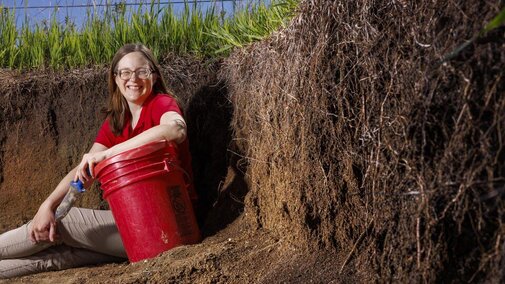Nebraska’s Judith Turk will use an $845,000 grant from the National Science Foundation’s Faculty Early Career Development Program to dig into the degradation of topsoil.
Agricultural productivity across the Great Plains is tied directly to the soil that covers it. Known to soil scientists as Mollisols, these thick, dark, organic-rich soils are inherently productive and fertile, helping farmers cultivate high-yielding crops.
But the very traits that make these soils conducive to agriculture are problematic for researchers trying to track the change in soil quality over time — which has important implications for food security and resilience to climate change.
“The thick topsoil in the Great Plains masks the effect of gradual degradation until it reaches an advanced stage,” said Turk, an associate professor and soil scientist at the University of Nebraska–Lincoln. “Degradation processes are slow, but they are happening.”
In her five-year soil study, which will integrate research, education and outreach, Turk will compare legacy soil data to today’s soil data to quantify change across various characteristics. She also will launch a new course at the university, introduce new teaching strategies and develop an outreach program for middle school students.
Pinpointing the degree and pace of soil change — and how deeply into the soil that change extends — is critical for developing effective strategies to mitigate and adapt to climate change. Turk’s research will inform soil carbon sequestration strategies and advance understanding of soil health, which is key to agricultural systems’ capacity to withstand extreme weather.
“The healthier our soils are, the more resilient our ecosystems and agricultural systems are,” Turk said.
Continue this article on Nebraska Today.

